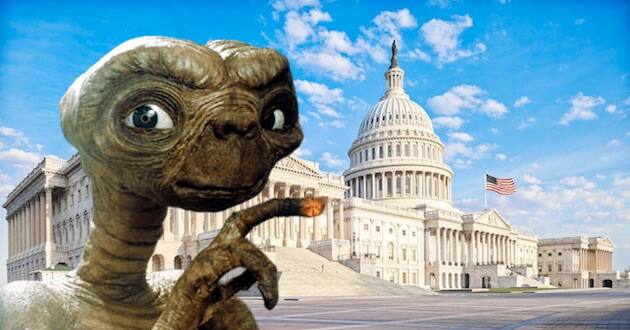Covid bill also requires Navy and FBI release data on UFOs

Was E.T. phoning home from the U.S. Capitol? Perhaps so as one of the most curious parts of the just-signed Coronavirus relief bill has to do with the Navy and UFOs.
While public and political attention focused on pork-barrel spending in the nearly $1 trillion bill, one requirement flew below radar – unidentified flying objects. At least until people started reading the 5,000-plus page document.
One of those that read far enough was the United Kingdom’s former head of the UFO division in its Defence Ministry, Nick Pope. He told The New York Post that the bill states that disclosures concerning UFOs be produced within 180 days and provided to Congress. That deadline began Sunday with President Donald Trump’s signature.
States Pope, “In this omni act that’s now been signed is the Intelligence Authorization Act for fiscal year 2021 and that has in it language on UFOs and specifically… UAP… Unidentified Aerial phenomena and specifically there is a request from the Senate Intelligence Committee to the Director of National Intelligence that a report be produced about the phenomenon within 180 days of enactment.”
The Senate Intelligence Committee made sure that the report must include “observed airborne objects that have not been identified.”
U.S. lawmakers are also requesting other information that has not been so forthcoming from the military, FBI or other agencies that have investigated the aerial phenomenon. Both Democrat and Republican lawmakers have demanded the following information:
1. A detailed analysis of unidentified aerial
phenomena data and intelligence reporting collected or
held by the Office of Naval Intelligence, including
data and intelligence reporting held by the
Unidentified Aerial Phenomena Task Force;
2. A detailed analysis of unidentified phenomena data
collected by:
a. geospatial intelligence;
b. signals intelligence;
c. human intelligence; and
d. measurement and signals intelligence;
3. A detailed analysis of data of the FBI, which was
derived from investigations of intrusions of
unidentified aerial phenomena data over restricted
United States airspace;
4. A detailed description of an interagency process
for ensuring timely data collection and centralized
analysis of all unidentified aerial phenomena reporting
for the Federal Government, regardless of which service
or agency acquired the information;
5. Identification of an official accountable for the
process described in paragraph 4;
6. Identification of potential aerospace or other
threats posed by the unidentified aerial phenomena to
national security, and an assessment of whether this
unidentified aerial phenomena activity may be
attributed to one or more foreign adversaries;
7. Identification of any incidents or patterns that
indicate a potential adversary may have achieved
breakthrough aerospace capabilities that could put
United States strategic or conventional forces at risk;
and
8. Recommendations regarding increased collection of
data, enhanced research and development, and additional
funding and other resources.
The report shall be submitted in unclassified form, but may
include a classified annex.








